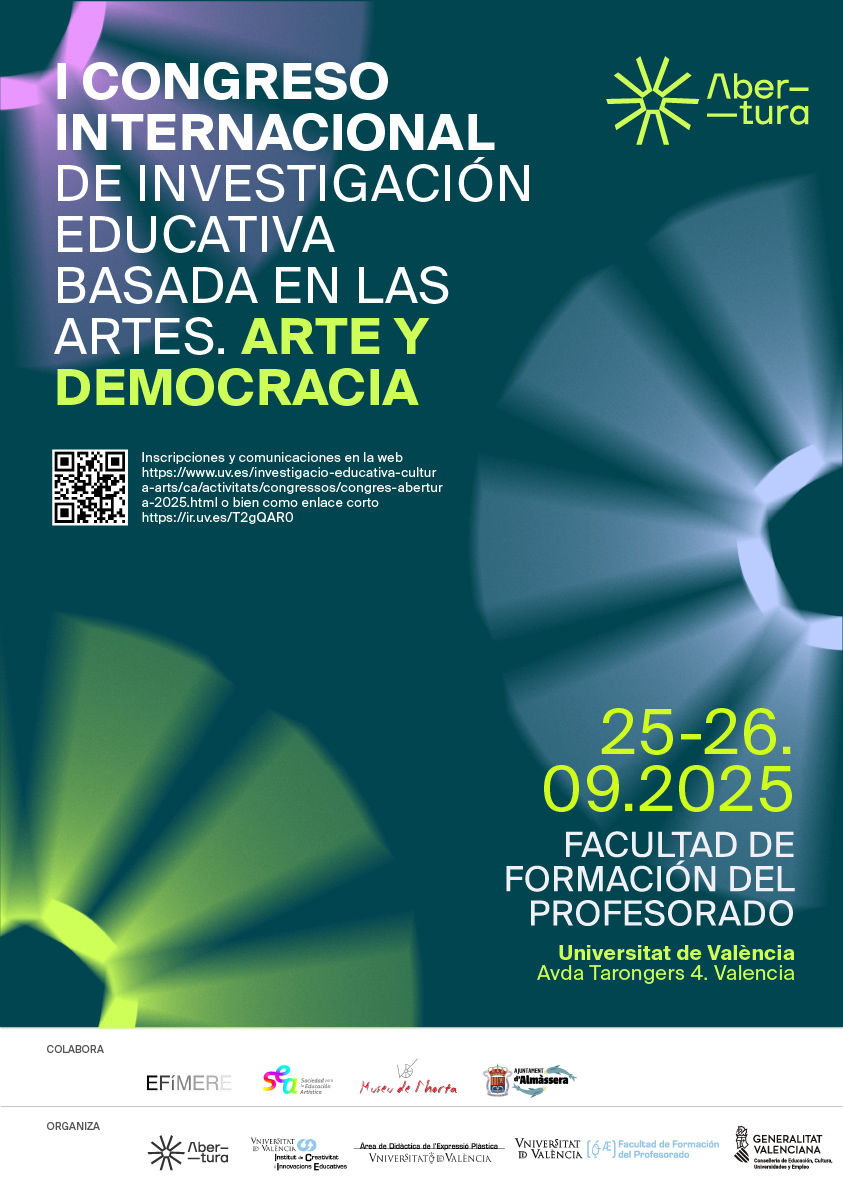
ABERTURA
I INTERNATIONAL CONGRESS ON ARTS-BASED EDUCATIONAL RESEARCH. Art and Democracy
Faculty of Teacher Training of the University of Valencia
September 25 and 26, 2025
Arts-based educational research is a cornerstone in the evaluation of citizen participation in initiatives for social transformation. In this sense, socially engaged artistic projects, art-based public pedagogy, artivism, and public art, among others, are key to fostering citizen participation in the creation of shared knowledge. It is not about giving voice to silenced groups, but rather about thinking pluralistically through the arts. These media enable artistic thinking about common problems in support of social inclusion and equality to the extent that they allow for fluid, critical, and consensual communication, in-depth discussion, and the presentation of these results for visibility.
To this end, we understand that holding a conference focused on deepening the advances and research that study these relationships represents both a necessity and an opportunity, and has an impact on raising awareness of all these strategies. It facilitates debate and defines an international push to make the arts a priority in the defense of democratic and social values.
In the face of the methodological polarization between quantitative and qualitative approaches, a third instrumental range opens up: arts-based research. In the educational context, these arts research methods constitute a distinct school of thought, known as arts-based educational research (ABER).
The Transformative Power of Art in Education
Art has a transformative power that, beyond aesthetics, acts as a catalyst for critical reflection and a driver of social change. Art has proven to be a powerful tool for driving social change and fostering civic engagement. In a world where social inequalities, cultural conflicts, and the climate crisis continue to shape global dynamics, artistic practices in education emerge as key tools for fostering social engagement. In other words, artistic practices are presented as a means to strengthen democratic values, promote inclusion, and challenge traditional power structures. This approach allows us to explore the connections between art, democracy, and critical pedagogies, transforming both educational practices and the communities in which they are developed. This transformative potential has been explored in artivism, public pedagogy, and citizen participation initiatives, but its integration into educational research still faces significant methodological challenges. Research must account for the impact of these practices, the strategies that validate them, the resources that prove useful, and the most pioneering approaches so that the evaluation of these actions guarantees their continuity with the necessary quality and success.
Need for evaluation and validation
To guarantee the continuity, quality, and effectiveness of these transformative actions, it is essential to have appropriate methodologies that allow for the assessment of their impact. However, traditional research paradigms are not always capable of capturing the complexity and richness of artistic interventions in educational and social contexts. When actions of social transformation are promoted through artistic media that focus on the poetic, symbolic, aesthetic, and critical, traditional methodologies are not the best paradigm from which to evaluate their impact. This methodological gap has driven the consolidation of ABER as a validation approach that combines aesthetic, critical, and reflective aspects, allowing for a comprehensive evaluation of these practices. Therefore, it is necessary to highlight arts-based educational research as a means of validating the artistic actions developed along these transformative axes.
The "First International Congress on Arts-Based Educational Research: Art and Democracy" is intended as a meeting of educational researchers and arts specialists from different fields to address how the arts contribute to strengthening democracy through: the resolution of pedagogical, social, awareness-raising, and teaching and learning problems in various disciplines; the creation of artistic thought; and the consolidation of a free culture that respects diversity. The ABERTURA conference aims to promote Art Based Educational Research (ABER) in Spain by inviting researchers, cultural mediators, teachers from all educational levels, and anyone interested in sharing the advances in this methodology and its future prospects from an educational or cultural perspective.
The conference will be held in person on September 25 and 26, 2025, at the Faculty of Teacher Training of the University of Valencia. The conference format will combine invited presentations, oral presentations, and a presentation of the results of citizen participation in artistic projects of social engagement, art-based public pedagogy, artivism, and more.

Funding: Grant for the organization and dissemination of international scientific, technological, humanities, or arts conferences, seminars, and meetings (CIAORG 2024) for the 2025 fiscal year, announced by the resolution of November 27, 2024, from the Conselleria d’Educació, Cultura, Universitats i Ocupació Referencia (Reference CIAORG/2024/132), for the organization of ABERTURA. I International Congress on Arts-Based Educational Research: Art and Democracy.





